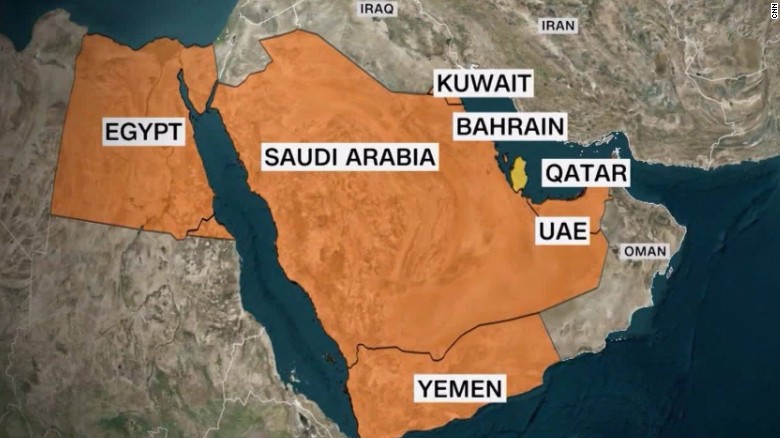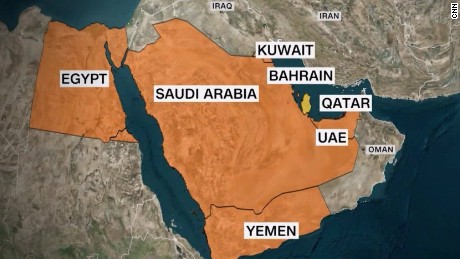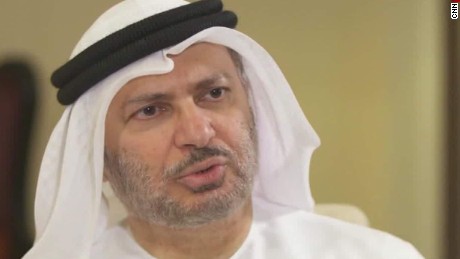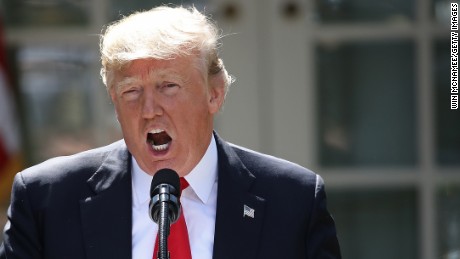Story highlights
- Turkish leader: "It is almost like a death sentence has been issued for the country"
- Rift between countries has led to the worst diplomatic crisis to hit the Gulf Arab states in decades
(CNN)Turkey's President Recep Tayyip Erdogan has slammed the isolation of Qatar, likening the diplomatic stranglehold of the small but wealthy peninsula by neighboring Gulf countries to "a death sentence."
Erdogan's support comes after nine countries -- including Saudi Arabia, Bahrain, Egypt and the United Arab Emirates -- severed ties with the oil-rich nation citing its alleged support and financing of terrorism.
The country has strenuously denied all charges, rejecting them as "unjustified" and "baseless."
The rift has led to the worst diplomatic crisis to hit the Gulf Arab states in decades with Qatari citizens expelled from the three Gulf nations involved as well as ending all air, sea and land links with Doha.
Erdogan: Qatar crisis is 'inhumane'
"To isolate a country's population in every respect is inhumane," the Turkish leader told his ruling Justice and Development Party in a weekly Parliamentary address in Ankara on Tuesday.
"Qatar is not the one who supports terrorism, quite the opposite. Along with Turkey, it is the country with the most resolute stance against ISIS which has caused grave damage to our region," Erdogan continued.
"It is almost like a death sentence has been issued for the country. Cutting of food, pharmaceuticals whatever you can think of the country is being squeezed, the airspace is being closed that is what the country is faced with."
Qatar is facing restricted airspace access since the diplomatic curtain fell around its borders. Qatar Airlines, a major global flight operator, is no longer allowed to use the airspace above Saudi Arabia, Egypt, Bahrain and the UAE. Saudi Arabia has also closed off Qatar's sole land border.
The only flight avenue open at present is through Iranian airspace. All this means flights to Africa and North America may have to make big detours -- raising fuel costs, flight times and potentially ticket prices.
What's behind Qatar-Gulf freeze?
So far, the Gulf states have not issued any formal demands to Qatar, but analysts suggest the deepening rift is being partially driven by the perception that Qatar is too close to Iran.
Saudi Arabia and Iran have clashed over several issues, including Iran's nuclear program and what Saudis see as Tehran's growing influence in the region -- especially in Syria, Lebanon and neighboring Yemen.
Qatar and Iran share the largest underwater natural gas field in the world. But recent Gulf reports have charged the relationship goes beyond resource management, accusing Qatari officials of meeting with the head of Iran's Revolutionary Guard Corps.
Erdogan's comments are not the first time Turkey has expressed support for Qatar since the crisis unfolded.
Ankara has also called upon all countries involved to engage in dialogue in the hopes of coming to a peaceful solution with Foreign Minister Mevlut Cavusogl offering to help mediate disputes.
"Dialogue should be continued under all circumstances so the existing problems can be solved in a peaceful way," he said, according to Turkish state news agency Anadolu last week.
Turkey has also fast tracked a decision to approve the deployment of troops to Qatar -- part of an existing bilateral agreement but widely interpreted as a show of support for the blockaded nation.





















